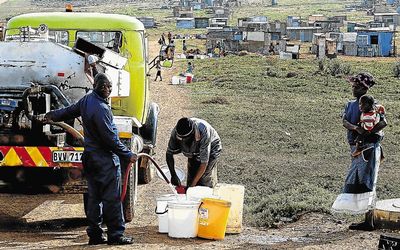Water can create work, UN report
by Staff Writer,
2016-03-23 09:23:37.0
A REPORT released by the United Nations (UN) has found that economic growth and job creation are inextricably linked to water resources.
The UN released the 2016 edition of the United Nations World Water Development Report‚ titled Water and Jobs on Tuesday‚ which was World Water Day‚ and is part of the UN’s 2030 Agenda for Sustainable Development campaign.
According to the report, 1.5-billion people are directly employed in water and natural-resource-dependent industries.
The development of water resources and sanitation services were an opportunity for job creation and economic growth‚ the report said.
"Water and jobs are inextricably linked on various levels‚ whether we look at them from an economic‚ environmental or social perspective‚ said Unesco director-general Irina Bokova.
"This analysis highlights the fact that water is work — it requires workers for its safe management and at the same time it can create work and improve conditions. If the 2030 agenda is to be a success and we are to build together a sustainable future‚ we must ensure that work in water is decent and that the water we all rely on is safe‚" said Guy Ryder, the director-general of the International Labour Organisation (ILO) and chairman of UN-Water.
"Investment in small-scale projects providing access to safe water and basic sanitation in Africa could offer an estimated economic return of about $28.4bn a year‚ or nearly 5 % of gross domestic product (GDP) of the continent‚" Mr Ryder said.
"Such investments also seem to have a beneficial effect on employment. In the US‚ every $1m invested in the country’s traditional water supply and treatment infrastructure generates between 10 and 20 additional jobs. Meanwhile‚ the US Department of Commerce’s Bureau of Economic Analysis found that each job created in the local water and wastewater industry creates 3.68 indirect jobs in the national economy.
"Currently‚ according to the report‚ almost 1% of the total workforce in both developed and developing countries work in the water sectors — which includes water management‚ construction and infrastructure maintenance‚ as well as water supply and sanitation.
"The need for investment into ageing and inefficient infrastructure is also a potential driver for employment in the sector. An estimated 30% of global water withdrawals are lost through leakage. In London the rate of loss is 25% and in Norway 32%. In some countries‚ irrigation practices are either nonexistent or outdated and result in poor agricultural productivity. In Africa, for example‚ agriculture is mainly rain-fed and less than 10% of its cultivated land is currently under irrigation‚ holding back job creation."
TMG Digital

Efforts to help municipalities improve their capacity and financial management are crucial in the battle to fight the scourge of poor service delivery. Picture: THE HERALD
A REPORT released by the United Nations (UN) has found that economic growth and job creation are inextricably linked to water resources.
The UN released the 2016 edition of the United Nations World Water Development Report‚ titled Water and Jobs on Tuesday‚ which was World Water Day‚ and is part of the UN’s 2030 Agenda for Sustainable Development campaign.
According to the report, 1.5-billion people are directly employed in water and natural-resource-dependent industries.
The development of water resources and sanitation services were an opportunity for job creation and economic growth‚ the report said.
"Water and jobs are inextricably linked on various levels‚ whether we look at them from an economic‚ environmental or social perspective‚ said Unesco director-general Irina Bokova.
"This analysis highlights the fact that water is work — it requires workers for its safe management and at the same time it can create work and improve conditions. If the 2030 agenda is to be a success and we are to build together a sustainable future‚ we must ensure that work in water is decent and that the water we all rely on is safe‚" said Guy Ryder, the director-general of the International Labour Organisation (ILO) and chairman of UN-Water.
"Investment in small-scale projects providing access to safe water and basic sanitation in Africa could offer an estimated economic return of about $28.4bn a year‚ or nearly 5 % of gross domestic product (GDP) of the continent‚" Mr Ryder said.
"Such investments also seem to have a beneficial effect on employment. In the US‚ every $1m invested in the country’s traditional water supply and treatment infrastructure generates between 10 and 20 additional jobs. Meanwhile‚ the US Department of Commerce’s Bureau of Economic Analysis found that each job created in the local water and wastewater industry creates 3.68 indirect jobs in the national economy.
"Currently‚ according to the report‚ almost 1% of the total workforce in both developed and developing countries work in the water sectors — which includes water management‚ construction and infrastructure maintenance‚ as well as water supply and sanitation.
"The need for investment into ageing and inefficient infrastructure is also a potential driver for employment in the sector. An estimated 30% of global water withdrawals are lost through leakage. In London the rate of loss is 25% and in Norway 32%. In some countries‚ irrigation practices are either nonexistent or outdated and result in poor agricultural productivity. In Africa, for example‚ agriculture is mainly rain-fed and less than 10% of its cultivated land is currently under irrigation‚ holding back job creation."
TMG Digital
























Change: -0.47%
Change: -0.57%
Change: -1.76%
Change: -0.34%
Change: 0.02%
Data supplied by Profile Data
Change: -1.49%
Change: 0.08%
Change: -0.47%
Change: 0.00%
Change: -0.04%
Data supplied by Profile Data
Change: -0.27%
Change: -0.22%
Change: -0.23%
Change: -0.22%
Change: -0.23%
Data supplied by Profile Data
Change: -0.28%
Change: -1.15%
Change: -0.07%
Change: -1.21%
Change: -0.22%
Data supplied by Profile Data